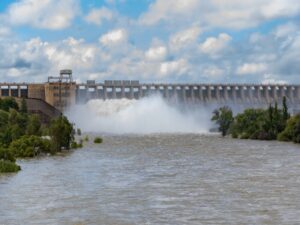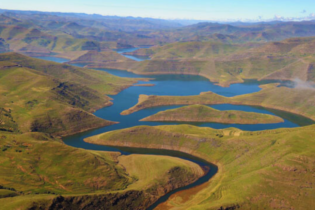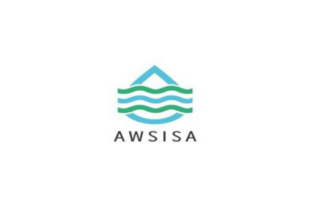In 2005, government approved plans for the establishment of the National Water Resources Infrastructure Agency (NWRIA). Kirsten Kelly gives an update about its rationale and status.
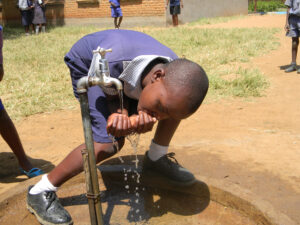 A lack of water is a constraint to economic growth. There is a need for greater investment in national water infrastructure. Unfortunately the fiscus has limited resources. The NWRIA is primarily established to create an enabling institutional environment for raising more private sector finance – domestically and internationally – for water resource infrastructure.
Currently, the Department of Water and Sanitation (DWS) cannot raise capital directly on the financial markets, and is reliant on special-purpose vehicles, such as the Trans-Caledon Tunnel Authority (TCTA), to finance and implement viable economic projects.
The current national water resources infrastructure base – if properly managed and maintained – can be leveraged to fund and develop the infrastructure requirements identified in the National Water Resource Strategy and Master Plan.
Furthermore, NWRIA will have the added advantage of an institution that separates the policy development and regulatory responsibilities of DWS, as the custodian of the national water resources, from the development and implementation responsibilities for infrastructure management.
A lack of water is a constraint to economic growth. There is a need for greater investment in national water infrastructure. Unfortunately the fiscus has limited resources. The NWRIA is primarily established to create an enabling institutional environment for raising more private sector finance – domestically and internationally – for water resource infrastructure.
Currently, the Department of Water and Sanitation (DWS) cannot raise capital directly on the financial markets, and is reliant on special-purpose vehicles, such as the Trans-Caledon Tunnel Authority (TCTA), to finance and implement viable economic projects.
The current national water resources infrastructure base – if properly managed and maintained – can be leveraged to fund and develop the infrastructure requirements identified in the National Water Resource Strategy and Master Plan.
Furthermore, NWRIA will have the added advantage of an institution that separates the policy development and regulatory responsibilities of DWS, as the custodian of the national water resources, from the development and implementation responsibilities for infrastructure management.
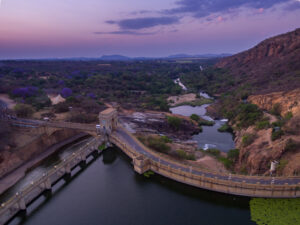 TCTA and the Water Trading Entity as well as all national water assets will be transferred to the NWRIA. The NWRIA will therefore have a substantial balance sheet and the intention is for it to work towards being able to raise finance, which is not backed by government guarantees. There will be substantial revenue streams associated with the NWRIA’s asset base which can be used to raise finance. Currently, the ability for TCTA to raise finance is constrained by a lack of balance sheet and revenue, as well as a limit to the amount of government guarantees that can be given without affecting its credit rating..
The establishment of the NWRIA will also strengthen governance and transparency in the water sector by separating the roles of player and referee. DWS will retain responsibility for planning, regulation, policy and price setting, whilst the NWRIA will build, operate and maintain water resource assets. It will also address the current fragmentation of asset management and revenue collection functions for national water resource infrastructure between the TCTA, the WTE and the department.
Furthermore, by absorbing the TCTA and water trading entity, the NWRIA will build a high level of technical capabilities. As the TCTA has a board, there will be no additional costs once the TCTA is absorbed because there will be only one board with the NWRIA.
The NWRIA should be open to considering a range of business models for the construction and operation of national water resource infrastructure such as public-private partnerships like build, operate, and transfer models. Business models will include the current TCTA model of financing that is backed with off-take agreements and explicit government guarantees.
TCTA and the Water Trading Entity as well as all national water assets will be transferred to the NWRIA. The NWRIA will therefore have a substantial balance sheet and the intention is for it to work towards being able to raise finance, which is not backed by government guarantees. There will be substantial revenue streams associated with the NWRIA’s asset base which can be used to raise finance. Currently, the ability for TCTA to raise finance is constrained by a lack of balance sheet and revenue, as well as a limit to the amount of government guarantees that can be given without affecting its credit rating..
The establishment of the NWRIA will also strengthen governance and transparency in the water sector by separating the roles of player and referee. DWS will retain responsibility for planning, regulation, policy and price setting, whilst the NWRIA will build, operate and maintain water resource assets. It will also address the current fragmentation of asset management and revenue collection functions for national water resource infrastructure between the TCTA, the WTE and the department.
Furthermore, by absorbing the TCTA and water trading entity, the NWRIA will build a high level of technical capabilities. As the TCTA has a board, there will be no additional costs once the TCTA is absorbed because there will be only one board with the NWRIA.
The NWRIA should be open to considering a range of business models for the construction and operation of national water resource infrastructure such as public-private partnerships like build, operate, and transfer models. Business models will include the current TCTA model of financing that is backed with off-take agreements and explicit government guarantees.
 Responsibilities will be limited to building, managing and operating national water resource infrastructure. This will assist municipalities by ensuring that there is a security of supply of bulk water. The department has other entities (the water boards) and programmes and grants which are aimed at assisting municipalities to provide access to water and sanitation to currently under-served communities.
There will also be an obligation to promote the development of projects that will meet the social needs of the country and not only to identify these projects, but to facilitate the financial arrangements and funding in terms of his project so that these projects will in fact materialise.
Responsibilities will be limited to building, managing and operating national water resource infrastructure. This will assist municipalities by ensuring that there is a security of supply of bulk water. The department has other entities (the water boards) and programmes and grants which are aimed at assisting municipalities to provide access to water and sanitation to currently under-served communities.
There will also be an obligation to promote the development of projects that will meet the social needs of the country and not only to identify these projects, but to facilitate the financial arrangements and funding in terms of his project so that these projects will in fact materialise.Legal standing
NWRIA will be incorporated and established as a juristic person, that is wholly owned and controlled by the State. It will be registered as a state-owned company in terms of the Companies Act, 2008 (Act No. 71 of 2008) and listed as a major public entity in terms of schedule 2 of the Public Finance Management Act. This reaffirms the position that it will not amount to privatization of water. Regarded as an independent legal entity, the NWRIA will become an integral member of society that will cooperate as a good corporate citizen with an ethical board and its accounting authority. It will be composed of not less than nine and not more than 11 executive and non-executive members. The governance chapter of the bill has been comprehensively crafted and compatible with the provisions of the Company Act. There is a clause dealing with the recovery of improper benefits or profits. There is another clause that allows for the investigation of the NWRIA and interventions to be taken by the Minister.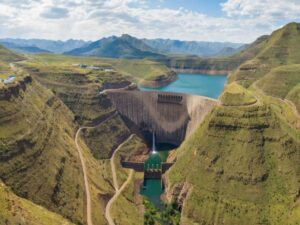 The NWRIA will not replace or supersede any existing institutions like catchment management agencies or water boards. It will also be bound to perform treaty and non-treaty functions. This will include the treaty on the Lesotho Highlands Water Project between the Government of the Kingdom of Lesotho and the Government of the Republic of South Africa (LHWP) ensures the supply of water by Lesotho to South Africa from the Orange River in return for royalties, which are used to construct dams that produce electricity.
The Minister may, in writing, request the NWRIA to plan, design and construct/maintain or rehabilitate infrastructure as further projects, which were not included in the corporate plan after consultation with Ministers of Finance and Public Enterprise, and subject to suitable financial arrangements that have been made.
Progress made on adoption of the Bill
The NWRIA Bill is a Section 75 Bill. The National Assembly adopted on 26th March 2024 and referred the Bill to the National Council of Provinces (NCOP) for concurrence. The NCOP has referred the Bill to the Portfolio Committee on Water and Sanitation for consideration. The Portfolio Committee on Water and Sanitation has adopted the B-list version and committee report of the National Water Resource Infrastructure Agency Bill, which brings to an end the committee’s consideration of the Bill. Having adopted the Bill and a report, the committee will recommend that the National Assembly adopts the Bill.
As part of the process, the committee received 120 public submissions, with oral submissions received from the National Economic Development and Labour Council (Nedlac), the South African Local Government Association (SALGA), the National Treasury and the Congress of South African Trade Unions (COSATU).
Some of the concerns raised during the public hearings included that there was no socio-economic impact assessment (SEIAS) on the Bill. The Department of Water and Sanitation has now confirmed that the Presidency approved the final SEIAS in June 2023, and the National Treasury has independently reviewed and assessed a business case for the NWRIA. It has also been emphasised that the right to water access will not be diminished by the NWRIA.
The portfolio committee proposed and adopted numerous amendments relating to the following clauses: 1, 3, 7, 9, 17, 34 and 35. Of critical importance to the committee was strengthening parliamentary oversight over the agency and critical amendments were made to ensure the submission of annual corporate plans and quarterly reports to Parliament, emphasising the role of the parliamentary committee in reviewing and engaging with these.
The NWRIA will not replace or supersede any existing institutions like catchment management agencies or water boards. It will also be bound to perform treaty and non-treaty functions. This will include the treaty on the Lesotho Highlands Water Project between the Government of the Kingdom of Lesotho and the Government of the Republic of South Africa (LHWP) ensures the supply of water by Lesotho to South Africa from the Orange River in return for royalties, which are used to construct dams that produce electricity.
The Minister may, in writing, request the NWRIA to plan, design and construct/maintain or rehabilitate infrastructure as further projects, which were not included in the corporate plan after consultation with Ministers of Finance and Public Enterprise, and subject to suitable financial arrangements that have been made.
Progress made on adoption of the Bill
The NWRIA Bill is a Section 75 Bill. The National Assembly adopted on 26th March 2024 and referred the Bill to the National Council of Provinces (NCOP) for concurrence. The NCOP has referred the Bill to the Portfolio Committee on Water and Sanitation for consideration. The Portfolio Committee on Water and Sanitation has adopted the B-list version and committee report of the National Water Resource Infrastructure Agency Bill, which brings to an end the committee’s consideration of the Bill. Having adopted the Bill and a report, the committee will recommend that the National Assembly adopts the Bill.
As part of the process, the committee received 120 public submissions, with oral submissions received from the National Economic Development and Labour Council (Nedlac), the South African Local Government Association (SALGA), the National Treasury and the Congress of South African Trade Unions (COSATU).
Some of the concerns raised during the public hearings included that there was no socio-economic impact assessment (SEIAS) on the Bill. The Department of Water and Sanitation has now confirmed that the Presidency approved the final SEIAS in June 2023, and the National Treasury has independently reviewed and assessed a business case for the NWRIA. It has also been emphasised that the right to water access will not be diminished by the NWRIA.
The portfolio committee proposed and adopted numerous amendments relating to the following clauses: 1, 3, 7, 9, 17, 34 and 35. Of critical importance to the committee was strengthening parliamentary oversight over the agency and critical amendments were made to ensure the submission of annual corporate plans and quarterly reports to Parliament, emphasising the role of the parliamentary committee in reviewing and engaging with these.


